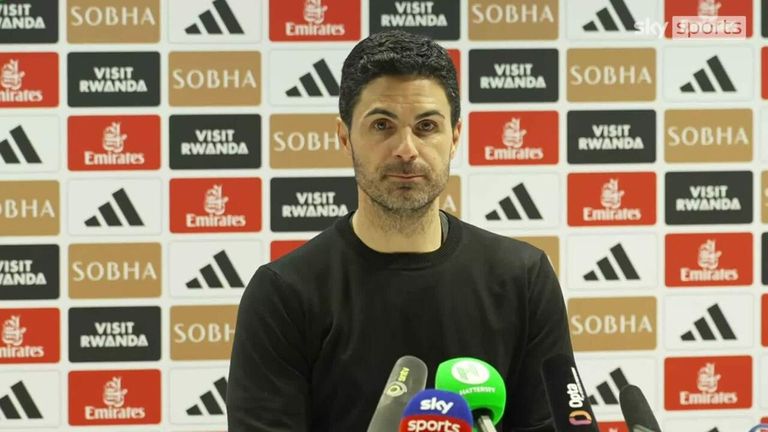Arsenal went three points clear at the top of the Premier League with a 5-0 defeat of Chelsea; Mauricio Pochettino’s team showed their inconsistency going from beating Everton 6-0 in the Premier League to this result

Chelsea boss Mauricio Pochettino was left despondent after his side were thrashed 5-0 by Arsenal in the Premier League.
Mauricio Pochettino criticised his Chelsea team after their 5-0 hammering at Arsenal, declaring: “When we have bad days, we are so bad.”
The chastening defeat – the club’s heaviest in a London derby since 1986 – following an FA Cup semi-final loss to Manchester City at Wembley on Saturday, dented their hopes of salvaging a European spot from a bitterly disappointing season.
Pochettino’s men made the short trip across the capital without 20-goal top scorer Cole Palmer due to illness.
- Arsenal 5-0 Chelsea – Match report & highlights
- How the teams lined up | Match stats
- Premier League table | Watch free Premier League highlights

Sky Sports’ James Savundra and Nick Wright react to Arsenal’s 5-0 demolition of Chelsea to send the Gunners three points above Liverpool in the Premier League.
Pochettino said: “We are showing this inconsistency and that is why we are where we are. We are able to have an amazing performance [against Man City] and then one like this. When we have bad days, we are so bad.
“It’s difficult to talk. We are talking after last season in the same way.
“We put in a fantastic performance at Wembley and then today, you can lose a game at Arsenal but in the way we competed, why one day, three days ago and then today in this way?
“For the circumstance, we needed to make changes for different reasons. Then it is about consistency.”

FREE TO WATCH: Highlights from the Premier League clash between Arsenal and Chelsea.
On being unable to select Palmer and whether that was a factor in the result, Pochettino added: “It wasn’t the reason we lost the game but you lose such a creative player that helps to play in the lines. It’s difficult to lose players in these circumstances – that made the management very difficult. But today was more than that.
“We didn’t compete from the beginning and it was difficult to be in the game against a team fighting for the Premier League. It’s no coincidence. We need to compete in a different way but we are talking too much during this season. All the information we receive – we want to be in a different position next season. We need to take decisions.”
Arteta: It was a joy to watch us

Arsenal manager Mikel Arteta was delighted with the performance of his side after they demolished Chelsea 5-0.
Arsenal manager Mikel Arteta said:
“I’m happy with the win and the amount of chances and goals we scored. Also the clean sheet shows the consistency of this team.
“We had to be more disciplined in the second half to do the right things and we created many chances and we defended the box so much better.
“I congratulated the players for making our supporters happy in a big London derby and it was a joy to watch them play. It’s onto Spurs now.
“They know what we are playing for. They are so excited and they are at it. Even the players that haven’t played much have been outstanding and that holds the team together.
“My job is to keep challenging and be demanding of them but to also make them believe they can do it because that is a very important thing.”
What’s next?
Arsenal continue their Premier League title bid at rivals Tottenham in the North London Derby this Sunday, live on Sky Sports. Kick-off 2pm.
Chelsea are on the road again with a trip to Aston Villa on Saturday. Kick-off 8pm. Mauricio Pochettino’s then host London rivals Tottenham, live on Sky Sports, on Thursday May 2. Kick-off 7.30pm.
Sourse: skysports.com